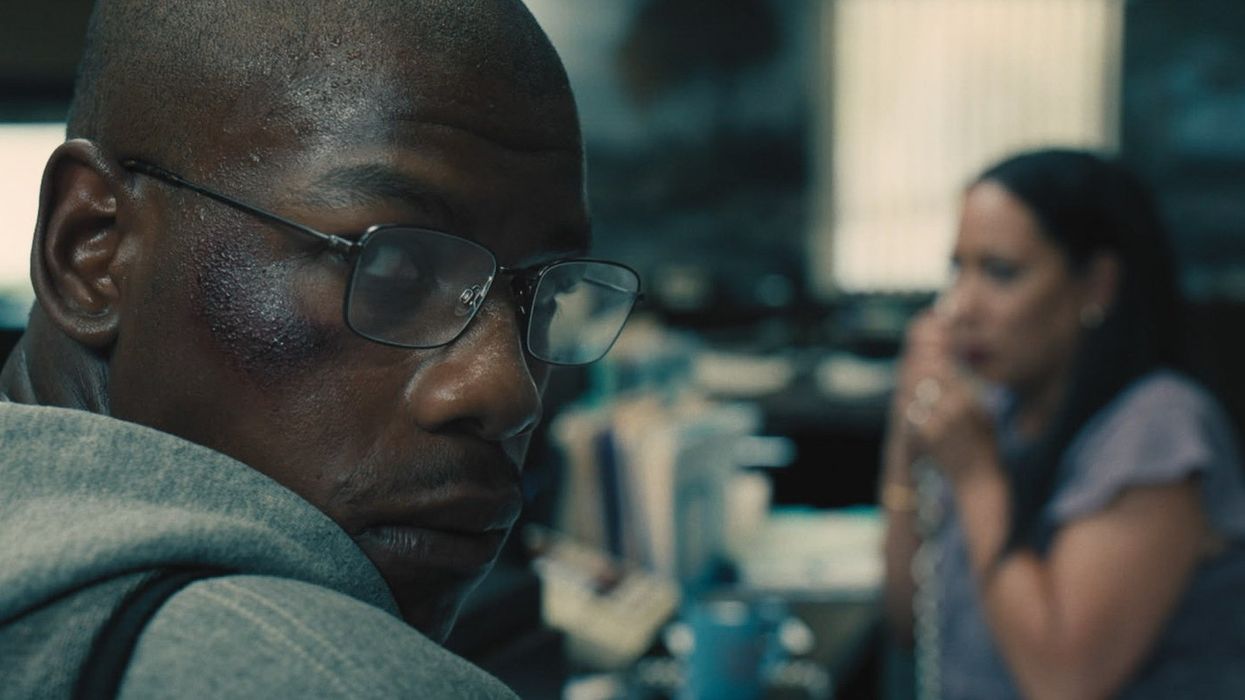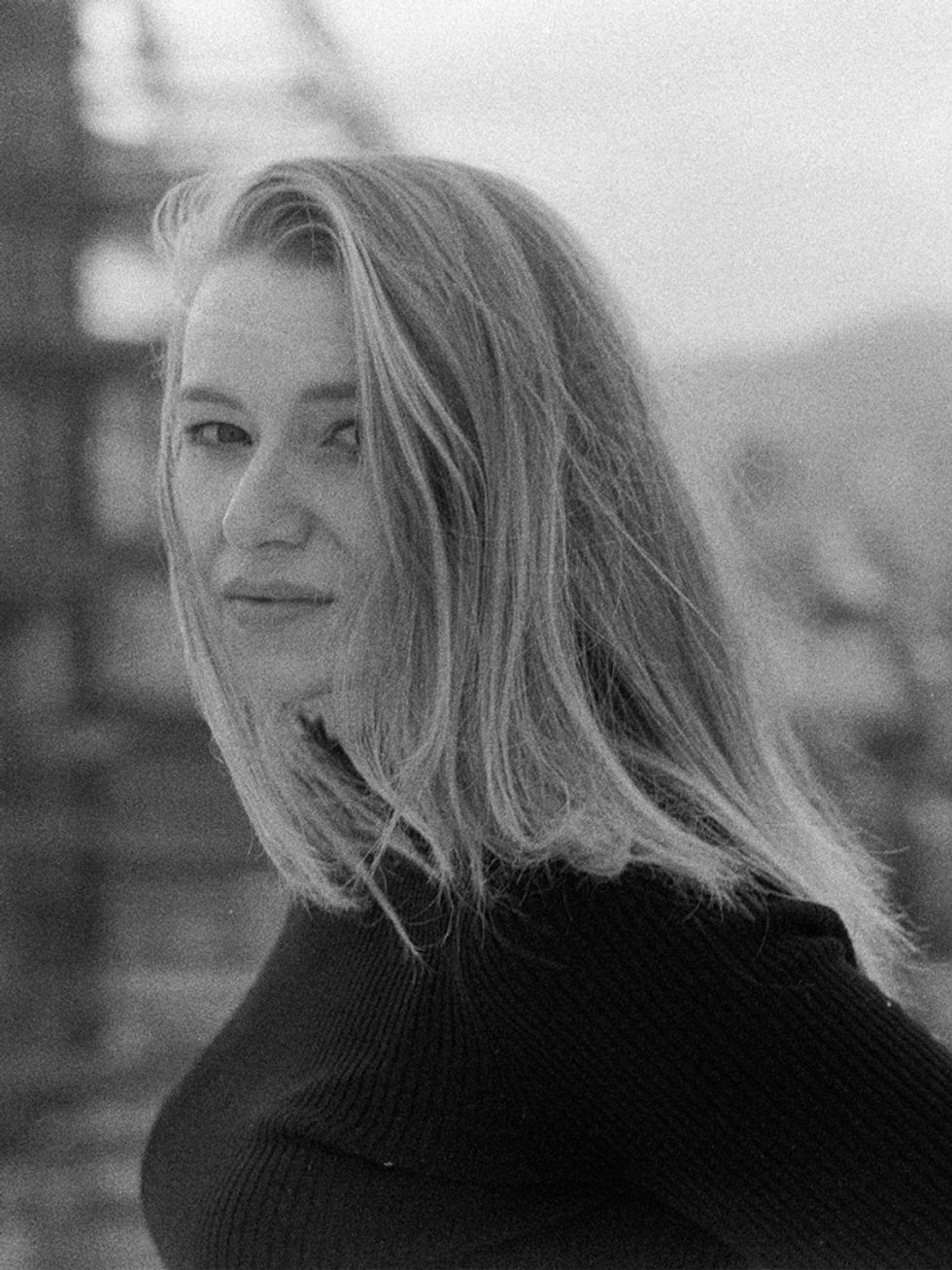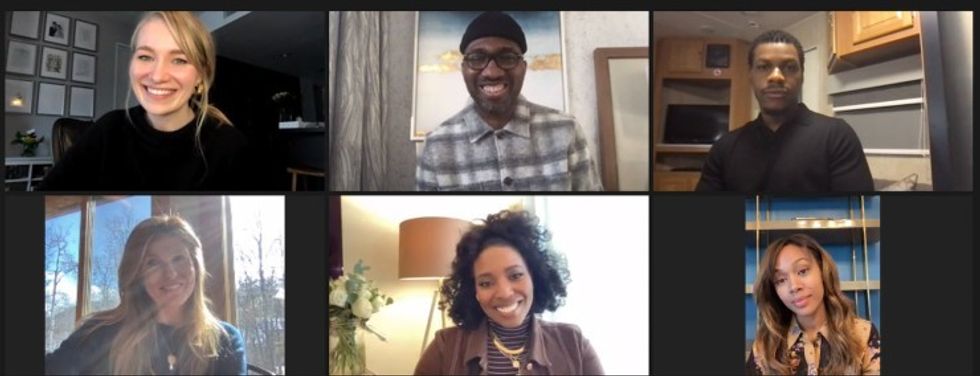How a First-Time Filmmaker Directed Michael K. Williams in His Final Role
892 is about the true story of a veteran, a bank, and a bomb.

Abi Damaris Corbin knew that to tell it right, she’d need the best actors—even if it was her first feature.
The film, whichjust had its premiere in the U.S. Dramatic Competition at the Sundance Film Festival, is an adaptation of the most desperate moment of U.S. Marine veteran Brian Easley. For director and co-screenwriter Abi Damaris Corbin, it was an important story to tell about compassion amidst a broken system. She first enlisted the help of John Boyega. From there, she got Connie Britton, and finally, Michael K. Williams.
Damaris Corbin spoke with No Film School to talk about the process of making 892 as her debut feature film.
No Film School: You went to college at only 14 years old. Did you know you wanted to be a filmmaker from a young age? What pulled you towards filmmaking?
Abi Damaris Corbin: I wasn't one of the people who knew they wanted to be a director when they were little. It was really far outside of my reach, film. I grew up in South Boston, I'm the youngest of five kids. We lived in a triple-decker. It’s a great place to grow up, and I grew up with a lot of humanity around me. My mom’s a teacher and she exposed us to lots of literature growing up.
I read everything I could get my hands on. And she brought me to the Museum of Fine Arts and brought me to music. It was hard for them to do that; my dad worked all night shifts and then brought me to plays Saturday morning.

I had such a deep love for art because it spoke to the soul in a way that it wasn't in my immediate surroundings. It was something that my parents knew I had a love for and an innate desire for, and brought me to. I'm really grateful for that.
The thing that bridged the gap for me was, there are a lot of stories in my world that weren't told. My dad worked at the post office. He’s a vet. I saw a lot of guys and girls grow up around me, not having the opportunity to know anything outside their world. I wanted to show that there's more, that there's hope. That you aren't just a cog in a big system.
NFS: You mention that your dad's a vet, and 892, your first feature, is based on the true story about Brian Easley, a vet. Why did you want to tell this story?
Damaris Corbin: I'm really grateful for journalists. I read Aaron Gell's article about Brian, and my heart broke because I saw in that article a reflection of my dad's struggles. And I had to tell it, it had to be told.
NFS: One standout aspect of this film is all these really big, talented actors in it. This is your first feature-length film. That could be terrifying. Was it intimidating to be working with so many experienced, talented people?
Damaris Corbin: As a young director, or as a director at any level, you're obligated to tell the truth of the story, at its best and most fullest form. For this, I had to find the right folks who could enable me to do so. And working with John, working with Michael, working with Connie, they're such pros. And we had honest, open conversations about who these people [they are playing] were and how we could best tell the truth of their stories. So when you're focused on the work, it takes a lot of the fear out of it.
And it allows you to just have open, honest communication about how do we best do this, and in so much that throughout working for them, they went above and beyond. John and Mike were there, off-camera for each other during those phone call scenes. And so was Olivia, and Salinas was off-camera for Nicole. It was an atmosphere of, how can we best get to the truth of this story?

NFS: How hard was it for you to get these actors together and get this project off the ground?
Damaris Corbin: Every film has its own story of how it's not easy. We certainly had a lot of challenges getting to camera. But we were really fortunate in that the development financiers who Kwame and I partnered with really cared about the story. They cared about telling a story about compassion, helping restore broken people and systems, and they jumped in as our main financiers when it looked like there might not be an option to have this film made. And John [Boyega] really was instrumental in making sure that this film came to light. He was able to be a huge partner for me in that regard.
NFS: You worked with Michael K. Williams, and it would be his last role, and the last time you saw him. I was wondering about your experience. Because, in filmmaking, you work with people on a project and tend to become really close, almost like family. But once the project ends, everyone goes back to their own lives. It can be difficult to know how to interpret that, especially when people move on to wherever their lives take them. What was that experience like, and do you have any philosophical thoughts about how do we work with each other in film?
Damaris Corbin: Working with Mike for me was a dream fulfilled. I told him that when I met him. He told me, "Hey, Abi, I got your back." We shared a personal connection about the story, and there [were] lots of ways in which we enjoyed each other as family on set.
He took a batch of my husband's chocolate chip cookies home on the plane. I'm not sure all of them made it. He definitely raided my fridge at one point in my trailer for some banana bread. He did in such a snapshot of time become a dear friend. We planned to have arugula smoothies when we were doing these interviews and the press came out.
So I'm pouring one out for him today, but I think the best thing you can do with people that have short snapshots in your life is be intentional in the moment, connect with them. We have a lot of us who worked together on this project. We have a film family, and I am really grateful for their encouragement, for their craft, for their art. And Mike gave so much heart to each person that was there, and just from him, I want to make sure that I'm intentional in every moment. Because you just never know.
NFS: What was your visual strategy for the film? I know you co-wrote the script with Kwame Kwei-Armah. When it came to direct, what were some of the things that you talked about with your DP?
Damaris Corbin: I can geek about that for a long time. Doug Emmett, who is my cinematographer, is an incredible artist. So you start, as we always do in, every department with: what's this story about, and what do we want to convey?
Visually, I wanted to make sure that there was never a moment that felt false in every department, across the board for the actors, for the cinematography. We wanted to control the color palette to make sure that we could convey the emotion that was needed within each scene. We wanted to make sure to escalate. It's a script that if you read it on a surface level, you say, "Hey, this takes place in one room." We never wanted you to feel that way.
It's a phone call movie, everybody's constantly on the phone, but we never want you to feel that way. We wanted you to be able to connect on a very human level. So we wanted you to see the pores of the skin of the actors, so that the humanity is what translates. In every decision that we made, we were very specific about choosing the color palette, the dirt on the windowsill, so that you could feel that these lives were lived, that this is a truthful thing.
NFS: How long was your production? And what was your day-to-day set like?
Damaris Corbin: Well, I usually get there pretty early. I think I read an article or a mentor told me this, or maybe it was No Film School. It's great for directors to connect with their department heads an hour before, when they all get there.
So I did my best to get there before everyone else so that I could settle, so that mentally I could connect. And there's always someone who needs something from you.
I wanted to make sure that my department heads and my actors, everyone was enabled to do their best work. So day-to-day, that's where we start. And then you remind yourself of why you're here. So the very first day that John was on camera was our second day shooting, and I got to tell you, that day was not going well. The power had gone out in the makeup trailer. The permit for the traffic holding had somehow been misplaced by one of the fire marshals or something like that. I don't remember who.
But then when John turned up on set, we had a moment of silence for Brian Brown easily, because it was four years to the day of the true events. And it felt like in that moment, it's one of those moments where everything else faded away. And it feels like destiny touches you, and John stepped onto camera, and you could see in that moment that Brian was there. And everything just started falling into place.
And you had the breath of truth. And a lot of the chaos around you faded, and everybody got their footing as is normal. There's always going to be a hiccup in a production. And that was our guiding light. It's like, "Let's get the truth on camera. Let's get the honesty that we know is there." And John at every take, every moment, you've seen, it's nuanced, it's honest. It's through-and-through truthful.
NFS: Do you have any advice for filmmakers?
Damaris Corbin: Greta Gerwig gave some early advice that spoke to me in one of her films. For young directors, learn to write. Learn to write if you can. If not, pick the camera, and find a friend who can, and enable yourself to tell stories that speak to the soul.
NFS: Any tips on how to learn to write?
Damaris Corbin: Read. Watch films obsessively. Go watch people on the street, listen to how they speak. Just live. Read, listen, and live.












